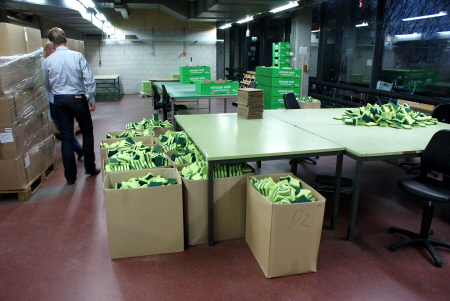There’s no way you can sell forced labour – 19 Q&A on #workfare

For some time now Doorbraak has been active in Leiden against the introduction of forced labour for benefit recipients. During discussions the advocates of the regulation try to justify it with a whole range of arguments. Here you can read how to counter the most widely used arguments.
| Translated into English by Jet The original text in Dutch (January 3rd, 2012) Ce texte en Français |
1. Everyone has to work for their living, so why not the benefit recipients?
The issue here is that those who receive benefits are forced to do labour for which they receive neither the legal minimum wage nor a contract under a Collective Labour Agreement (CAO). They are also deprived of the labour rights that other employees do have. In addition they are not free to choose what kind of work they want to do, and this is a fundamental right.
2. But isn’t it work that is important to society and that does not get done right now?
If society thinks this work is so important, then why is there no money available to reward the work like any regular work? Instead of forcing the benefit recipients into forced labour, we should force the government to make funds available for a normal salary.
3. But things simply are like this as there is not enough money because of the crisis.
Not really, there is more than enough money in the Netherlands. Have a look at our campaign “Where is the money?”. Ever since the late seventies the consecutive governments have been redistributing the wealth from the bottom upwards. In other words, they are making the rich richer and the poor poorer.
4. If that is national policy, the municipalities cannot do anything about it. They do not get enough money from the government.
The municipalities get less money, that is correct. But that does not mean that they have to introduce forced labour. This is a local political choice. It originates from three requirements: a) to discipline benefit recipients and make and keep them obedient; b) to make life on benefits unpleasant to such an extent that people want to escape it; c) to scare working people away from the struggle for improvement of their wages and working conditions, by making them fear unemployment and the subsequent forced labour they may be subjected to. In this manner the municipality creates a “favourable investment climate” for businesses in the city.
5. But isn’t this work in the own interest of people on welfare, because their chances on the labour market will improve when they have work experience?
Most of the work that benefit recipients are forced to do does not increase their opportunities on the labour market. Usually it is work that is no longer carried out because the relevant jobs have been cut. In other words: the experience they get is in jobs that hardy exist anymore. It is simply an attempt by the government to get work done without having to pay the wages that they had to pay for the same work in the past. Then again there is also the entirely meaningless kind of forced labour that does not result in any useful experience and that only serves to discipline the benefit recipients.

6. There is a small group of people who need this extra push. They may not like it, but in the end they will see the benefit of it all.
That is a paternalistic point of view. Most people are willing to work but the work should have a decent wage, good working conditions and a Collective Labour Agreement. The section of the labour market that the benefit receivers are forced into does not have such jobs. But what if we turn it around: what if we put pressure on the politicians, the municipality, the implementing body and civil servants, and the profiting businesses. Everyone who is an accessory to introducing forced labour in the Netherlands will get this extra push from us. They may not like it, but in the end they will see the benefits.
7. You should not look down on the kind of work that is offered to people on welfare.
Not when it is work that is useful to society, no. We are not looking down on the work itself, but on the low wages for forced labour that are even below the legal minimum. We are also against the system – without labour rights – under which the work has to be done.
8. If you are on welfare, this is better than hanging around at home.
Many unemployed have more than enough to do without a paid job. How is it normal to talk about forcing people who cannot find a job, into anything you like? Get rid of all forms of disciplining of welfare recipients. Doorbraak does not care much for the widespread emphasis on ‘work ethics’.
9. There is no harm in benefit recipients doing something in return for the welfare they receive.
Welfare recipients want to contribute to society and do meaningful work just like anyone else, and they are entitled to a regular income they can live on, just like anyone else.
10. You know, these benefit recipients should stop complaining, it’s only for a few weeks.
Every minute of work below the minimum wage is one too many. It undermines the labour rights of everyone. The workers’ movement has fought hard for these rights. Now we must once again fight in order to take back our rights. And don’t forget: the period of forced labour can be extended to two years or more.
11. But there are people on benefits who like their work and are glad that the municipality offers them this chance.
For sure this is true in some cases because doing meaningful work can give you a good feeling. But these people will certainy be happier if they get paid a decent minimum wage and receive a contract with a Collective Labour Agreement and labour rights.
12. The companies that employ benefit recipients should be valued for the risk they take. They create jobs for people who at first probably do no perform sufficiently.
Don’t be fooled, it is straightforward exploitation. Workers for free, without labour rights, what else can a boss wish for? Benefit recipients are usually forced to do the most senseless and stupefying work, learning nothing and except perhaps for the first few minutes. The companies are clever: from now on they can replace one forced labourer with the next. If this continues they will hardly have to offer any regular jobs.
13. The supervisors of the jobless are good people, so it will not come to that.
The personal character of the supervisors is irrelevant, especially for those on welfare who are put to forced labour by them. It is about the policy they have to implement. The culture and management in Social Affairs is extremely competitive. Employees are held accountable for the number of benefit claimants they have scared away from welfare, or obliged to do forced labour. This most certainly affects the attitude of the employees towards benefit recipients.
14. You shoudn’t use the term “forced labour”, it is too strong. That was something the Nazis did during World War II, and it is not as bad as that.
Forced labour is not just about the concentration camps. In addition to these the Nazis also imposed forced labour on millions of others, among whom more than 400,000 Dutch people. Many regimes across the world have been, and still are, involved in forced labour. It is still widespread and now it has returned to the Netherlands. According to Article 4 of the European Convention on Human Rights, that was ratified by the Netherlands, forced labour is putting someone to work against their will and threatening them with punishment. Benefit recipients are threatened by the municipality with a penalty reduction or even with stopping their benefits altogether if they refuse to work, and this is a clear attack on their livelihoods.
15. But hasn’t this been decided democratically?
The fact that there is a majority in parliament and in city councils does not mean that we have to agree with it, or even accept it. It concerns our lives and our existence, as well as the livelihoods of all those other people who may risk unemployment and could end up in such a system of forced labour. We have the right and the obligation to oppose this.
16. But it cannot be all that bad when left-wing parties such as the Socialist Party (SP), Labour Party (PvdA) and the Greens (GroenLinks) often agree with these regulations. And it seems the unions are OK with three months’ working without an employment contract.
Unfortunately it is often the case that left-wing parties and unions feel they should support right-wing policies and try to sell these to us. This means that the protest has to take place outside of parliament, with ad hoc support from left-wing party activists.
17. The left wing parties in Leiden have recently negotiated that benefit recipients only have to work 24 hours per week. With the money from their benefit this adds up to the minimum wage. Problem solved.
Actually it isn’t solved, because there is no contract with Collective Labour Agreement and in case of a labour dispute the threat of a penalty reduction still remains. Also in Leiden those on welfare are forced to work under the regime of Social Affairs, without proper labour rights.
18. You leftist activists simply don’t want to work.
Activists work with full dedication and without any pay for a better world for everyone. That is extremely meaningful work! And a lot more dignified than designing, drafting, implementing and taking advantage of, forced labour for other people. Most of the participants in the protests have a paid job, by the way. Not that this makes all of them overly happy because there are a lot of low-paid shitty jobs in the Netherlands.
19. Good thing that you are critical. We will be alert to monitor if any abuse such as forced labour arises.
It is not enough to pay attention to ‘excesses’. The entire forced labour project is a form of abuse and must be halted right away. It is unacceptable as a matter of principle.
Eric Krebbers
